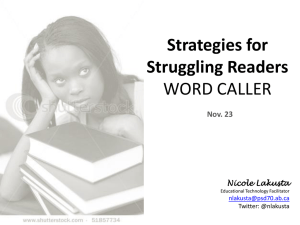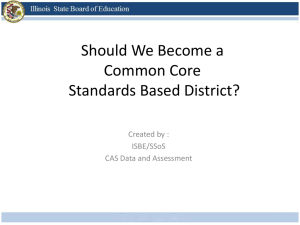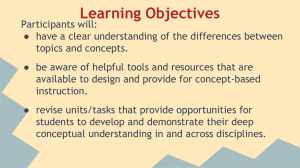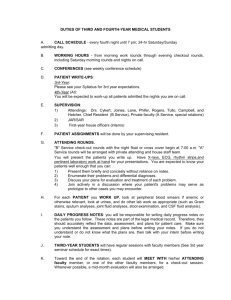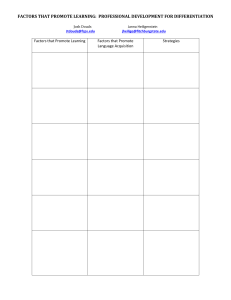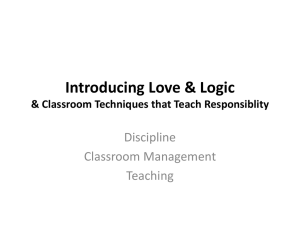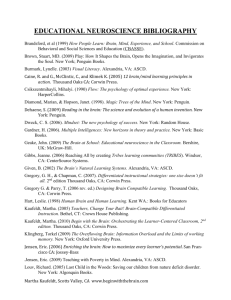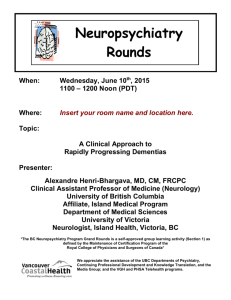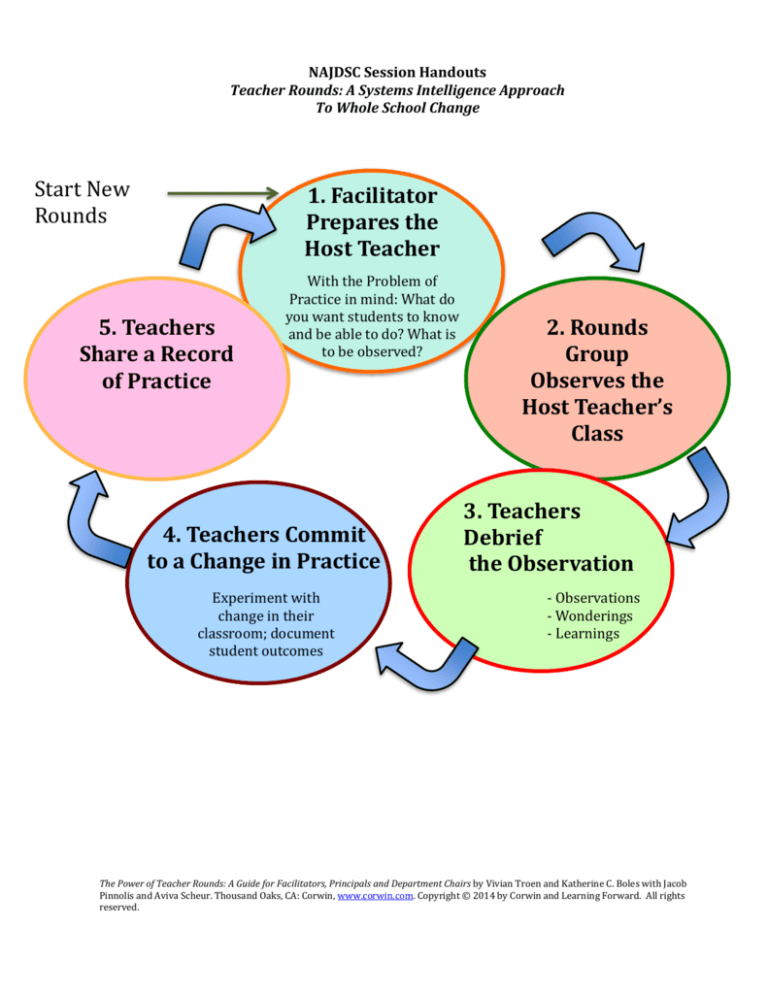
NAJDSC Session Handouts
Teacher Rounds: A Systems Intelligence Approach
To Whole School Change
Start New
Rounds
1. Facilitator
Prepares the
Host Teacher
5. Teachers
Share a Record
of Practice
With the Problem of
Practice in mind: What do
you want students to know
and be able to do? What is
to be observed?
4. Teachers Commit
to a Change in Practice
Experiment with
change in their
classroom; document
student outcomes
2. Rounds
Group
Observes the
Host Teacher’s
Class
3. Teachers
Debrief
the Observation
- Observations
- Wonderings
- Learnings
The Power of Teacher Rounds: A Guide for Facilitators, Principals and Department Chairs by Vivian Troen and Katherine C. Boles with Jacob
Pinnolis and Aviva Scheur. Thousand Oaks, CA: Corwin, www.corwin.com. Copyright © 2014 by Corwin and Learning Forward. All rights
reserved.
HOST TEACHER PREPARATION FORM
To help focus the Round, please fill out this form and email to your Rounds group
Name
Date of Round
1. Review/explain problem of practice
2. Provide context for the lesson
o What is the task?
o What is your role as the teacher?
o What are the students going to be doing?
3. On what should the observers focus their attention?
4. To what extent should/would you like observers to interact with students?
The Power of Teacher Rounds: A Guide for Facilitators, Principals and Department Chairs by Vivian Troen and Katherine C. Boles with Jacob
Pinnolis and Aviva Scheur. Thousand Oaks, CA: Corwin, www.corwin.com. Copyright © 2014 by Corwin and Learning Forward. All rights
reserved.
Rounds Debriefing Protocol
(1 hour 15 minutes)
1. Honoring Commitments
Review briefly what you have done since the previous month’s meeting and share Records of
Practice showing evidence of that commitment. (15 minutes)
2. Sharing Observations
a) Host teacher reflects on the lesson, explains what his/her goals were for addressing the
problem of practice, in what ways goals were or were not met and shares data on what
students learned. (2 minutes)
b) All observers take a few minutes to review notes and jot down specifics on the lesson
focusing on how the lesson attempted to address the problem of practice. (2 minutes)
c) Observers share data from observation. What did you see? Use descriptive data only, not
inferences or judgments. (10 minutes)
3. Wonderings/Open, Honest Questions
What do you genuinely wonder about in what you saw in observation? These are open,
honest questions. The questions should not have preambles, should not be disguised advice,
and you should not have a particular answer in mind. The point is not to offer solutions, but
to stimulate thinking. (10 minutes)
4. Selective Response by Host Teacher
Respond to what seems most relevant to the problem of practice, extend a wondering, etc. (3
minutes)
5. Learnings
Each person will describe something he or she has learned from the observation and debrief.
(10 minutes)
6. Commitments
How will you modify your instruction based on what was learned during the observation and
debrief? (10 minutes)
7. Develop a plan to experiment
Teachers develop a plan to experiment with modifying their practice prior to the next Round.
(10 minutes)
The Power of Teacher Rounds: A Guide for Facilitators, Principals and Department Chairs by Vivian Troen and Katherine C. Boles with Jacob
Pinnolis and Aviva Scheur. Thousand Oaks, CA: Corwin, www.corwin.com. Copyright © 2014 by Corwin and Learning Forward. All rights
reserved.
Rounds
Host Teacher Preparation Form
Name Aviva Scheur
Date of Round Tues. 10/19/12 J block
1. Review/explain problem of practice
I have students of various Hebraic and content abilities in my Tanakh 202 class. I am concerned about
domination by some more participatory students, and lack of participation by others.
I want to foster high-level discussion with students who have more limited content knowledge and/or who are
passive in class. I would like students (a) to support their comments with textual evidence; (b) to show they are
listening to one another by responding to each other and that (c) the level of analysis in their comments is strong.
2. Provide context for the lesson
Our class has studied parts of the first 2 chapters of the book of Jonah in Hebrew (and will be tested on the
Hebrew during the class prior to the one you are observing)and the remainder in English. During your
observation we will be somewhere in Jonah Chapter 3. The discussion may center around the steps of the
Ninevites to “turn” and God’s corresponding “turning.” Or we may still be comparing God’s first words to
Yonah in chapter 1 with His modified instructions now and how they may or may not have influenced Yonah’s
changed response.
3. On what should the observers focus their attention?
Look for and record data that indicates the level of thinking that is required from students. This is connected to
problem of practice. The data you collect might include:
How often do students support their comments by reference to the text?
How often do students specifically reference other students’ remarks in their own comments: building upon,
disagreeing, responding to each other, asking clarifying or probing questions? Please note these specifically.
How often do students address each other?
Record questions and comments that fit into the different types listed in Bloom’s taxonomy: knowledge (e.g.
recall), comprehension (e.g. select the correct fact or idea; interpret), application (e.g. why is this significant,;
compare/contrast) or synthesis (combine ideas to form a whole) or evaluation (e.g. supported value judgment)
Record data on the issue of having all students play an active role in their own learning. - -Record which
students participate (or not) and how often?
- Record what I say or do (or miss doing) to encourage response from all students
To what extent should/would you like observers interact with students?
I encourage you to look at what they are doing, their books, their notebooks, any distractions, etc, Focus on
recording relevant data on the foci of your observation.
If there is hevruta work, feel free to circulate and listen to different pairs, making notes of things you see and
hear that are relevant to our focus on the dynamics of discussion with an emphasis on student-centered
conversation.
The Power of Teacher Rounds: A Guide for Facilitators, Principals and Department Chairs by Vivian Troen and Katherine C. Boles with Jacob
Pinnolis and Aviva Scheur. Thousand Oaks, CA: Corwin, www.corwin.com. Copyright © 2014 by Corwin and Learning Forward. All rights
reserved.
ROUNDS OBSERVATION WORKSHEET
Teacher ________________________
Date __________
Problem of Practice
Teacher actions, quotes
Student names, actions,
quotes
Questions/analyses
The Power of Teacher Rounds: A Guide for Facilitators, Principals and Department Chairs by Vivian Troen and Katherine C. Boles with Jacob
Pinnolis and Aviva Scheur. Thousand Oaks, CA: Corwin, www.corwin.com. Copyright © 2014 by Corwin and Learning Forward. All rights
reserved.
Guidelines for Asking Honest, Open Questions
Adapted from Dr. Parker J. Palmer, The Center for Courage and Renewal
...in support of the rule “no fixing, no saving, no advising, no setting each other straight”
and in support of our intention to help each other listen for inner truth…
1.
An honest, open question is one that you cannot possibly ask while thinking “I
know the right answer to this.”
Example: “I wonder why you didn’t have more structure in the lesson. Have you
considered adding more structure in the lesson?” This question is not an honest
question, because the asker assumes he or she already knows the answer.
Better: “I wonder – what impact does the structure of the lesson have on student
participation?”
2.
An honest, open question does not have an obvious answer.
Example: “Is this your normal routine?” This can be answered with a simple
yes/no, and thus does not generate much discussion or learning.
3.
Ask questions that are brief and to the point. Don’t lard them with rationales and
background materials that allow you to insert your own opinions or justify your
advice.
4.
Ask questions aimed at helping the focus person explore his or her concern,
rather than satisfying your own curiosity.
5.
If you aren’t sure about a particular question, sit with it for a while, and wait for
clarity.
Learning to ask honest, open questions is challenging. We may slip occasionally into old
habits of trying to “fix” others. It helps to continually remind ourselves that our purpose
in this exercise is not to show what good problem-solvers we are, but rather to support
another person in listening to his or her own inner teacher.
The Power of Teacher Rounds: A Guide for Facilitators, Principals and Department Chairs by Vivian Troen and Katherine C. Boles with Jacob
Pinnolis and Aviva Scheur. Thousand Oaks, CA: Corwin, www.corwin.com. Copyright © 2014 by Corwin and Learning Forward. All rights
reserved.
Records of Practice
Keeping track is a matter of reflective review and summarizing, in which there is both
discrimination and record of the significant features of a developing experience….It is
the heart of intellectual organization and of the disciplined mind.
John Dewey
Experience and Education
Records of Practice - a record of practice is an artifact; it is something tangible from
the realm of practice that can be studied by participants in the rounds group.
We use artifacts to provide concrete evidence of changes made in teaching practice and
student learning. This isn’t about tracking progress but rather about tracking the process
of changing our practice. When deciding on an artifact type, first consider the purpose of
collecting the record of practice and the question of practice you have in mind. Then you
can determine the artifact that best fits that purpose and question.
Examples:
Assessment
Student work
Teacher’s journal
Smart board notes
Video
Discussion questions
Reflection Questions for Presenting your Artifact
How does the artifact relate to your goal?
What is different in your practice now as a result of the work you have done on this
goal?
What’s the next level of learning for you?
The Power of Teacher Rounds: A Guide for Facilitators, Principals and Department Chairs by Vivian Troen and Katherine C. Boles with Jacob
Pinnolis and Aviva Scheur. Thousand Oaks, CA: Corwin, www.corwin.com. Copyright © 2014 by Corwin and Learning Forward. All rights
reserved.

